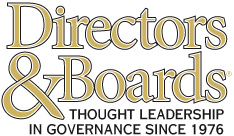|

In Memoriam
Should Directors Meet with Shareholders?
If
circumstances call for such a meeting, here are several suggestions
for maximizing the usefulness of this session.
By Michael A. Miles
Ed. Note:
Michael Miles, the former chairman and CEO of Kraft Inc. and Philip
Morris Companies, died in November 2013 at the age of 74. He was one
of the earliest chief executives to address a topic that is one of the
most pressing concerns in corporate governance today — shareholder
access to the board of directors. This is an excerpt from a larger
article he authored on this topic in 1996 for
Directors & Boards.
An important
question confronting chief executives, boards of directors, and
institutional shareholders is whether nonexecutive directors should
meet with the institutional shareholders. My view can be stated
unequivocally in two words: “Yes, but . . . .”
The
“yes” part is fairly obvious. Shareholders are, after all, the owners
of the company and are the “bosses” to whom the directors are
accountable. As such, shareholders — and I believe that includes all
shareholders — have the right to meet with whomever they have a
legitimate reason to meet with, be it the CEO, other
members of senior management, or the directors of the company.
But,
I do believe there are “buts” and mine are as follows:
•
There should be an important, specific director-level reason for the
meeting.
•
The meeting should be requested only when the regular channels of
communication have been exhausted.
•
Since it is often very difficult to get all outside directors together
at once, it is best to focus on the most relevant subgroup:
compensation committee, audit committee, nominating committee, or the
like.
•
Unless there is a very real reason not to, it is best to invite the
CEO.
• It
will help to provide attendees with homework materials in advance so
that they come prepared.
•
Don’t look for instant decisions in a meeting, but do insist on
appropriate follow up.
•
Unless and until you want to play hardball and get a reputation for
same, don’t preview or review your grievances in the press.
• Be
careful to observe all the legalisms.
• If
one or at most two meetings have not been productive, don’t expect
that any more will be either.
While you may have
arrived at some of this advice already, I hope these views on
director/shareholder meetings will be useful in guiding your course of
action in this important and sensitive aspect of corporate governance.
FIRST QUARTER 2014
|
